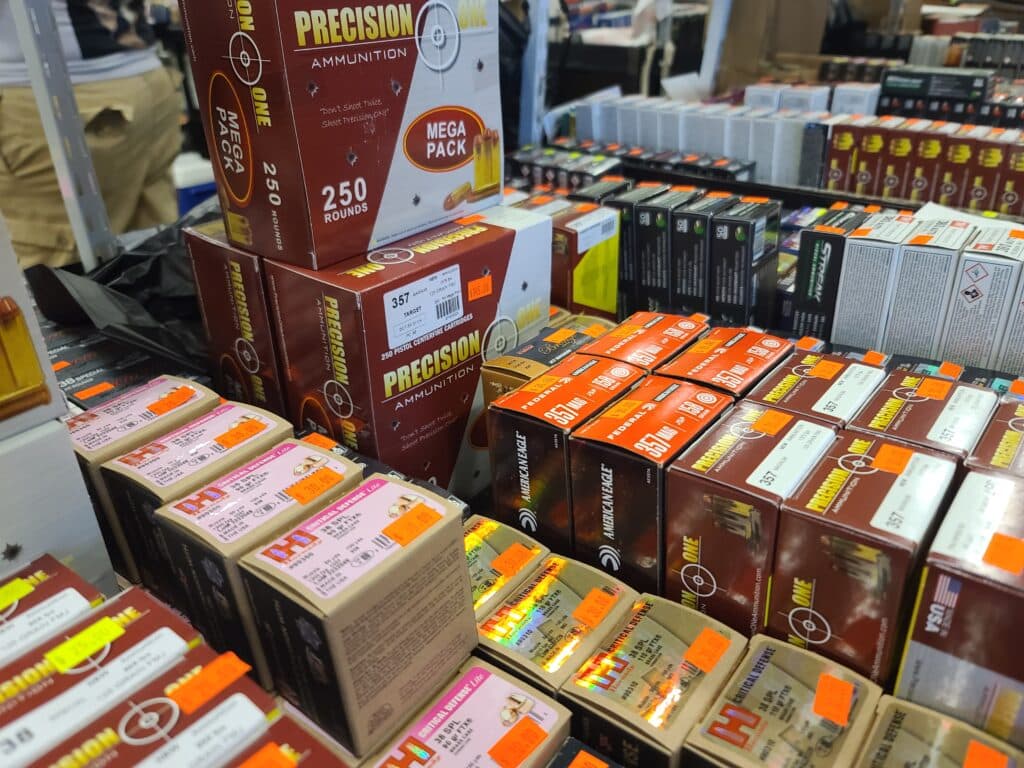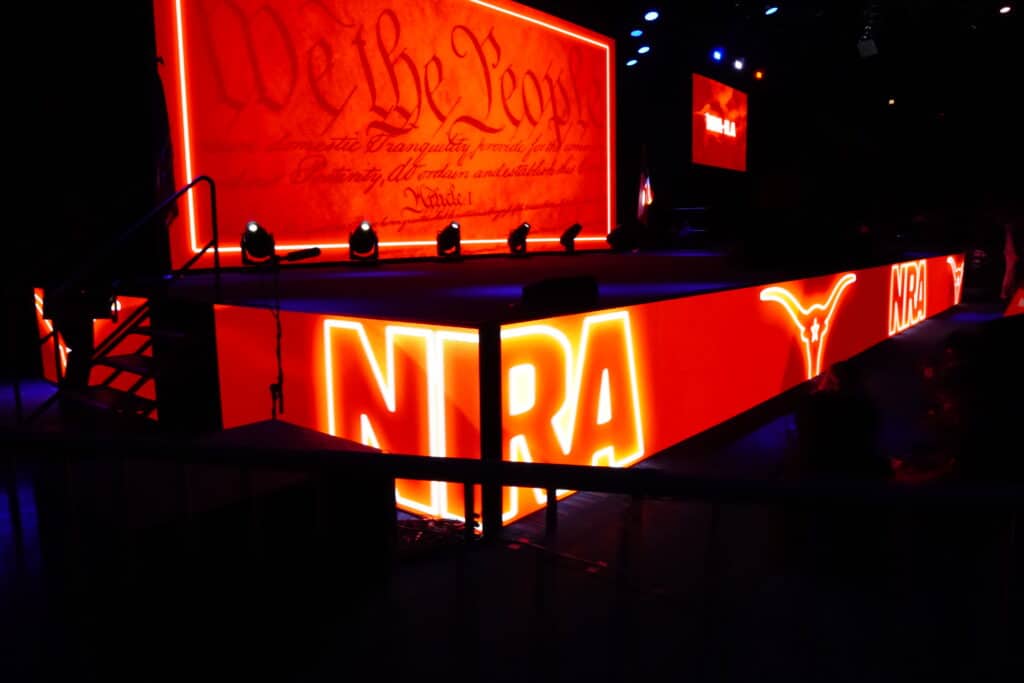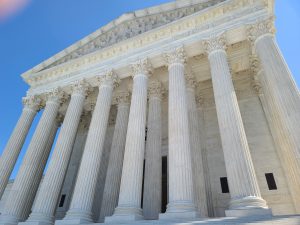Is the Second Amendment compatible with purchase permits?
That’s the question raised by some interesting comments by one of the gun-rights movement’s favorite jurists. Federal judge Roger Benitez struck down California’s ammunition background check law this week. But, as Contributing Writer Jake Fogleman explores, his opinion in the case seemed to leave the door open for purchase permits after a pair of conservative Justices did the same in Bruen.
On the other side of the country, the New York Attorney General’s Office wrapped up its case in the NRA corruption trial. What happens to the nation’s largest gun-rights group will be determined by a number of factors. But I lay out why at least part of the judge and jury’s decision will come down to where some of the group’s actions fall on the line between mismanagement and malfeasance.
We also have an interview on the podcast with a gun voter who is unhappy with his options. Plus, my firsthand report from the NRA’s corruption trial.

Analysis: Federal Judge Strikes Down Ammo Background Checks, Leaves Door Open on Purchase Permits [Member Exclusive]
By Jake Fogleman
A fan-favorite judge among gun-rights advocates knocked out the Golden State’s ammunition background check system on Wednesday. But he also hinted an alternative proposal could pass legal muster.
US District Judge Roger Benitez issued a permanent injunction against California’s criminal background check requirement for ammunition purchases and interstate sales restrictions after finding that they ran afoul of the Constitution’s Second Amendment and dormant Commerce Clause.
“In the end, the State has failed to carry its burden to demonstrate that the ammunition background check laws ‘are consistent with this Nation’s historical tradition of firearm regulation,’ as required by Bruen,” he wrote in Rhode v. Bonta. “Therefore, California’s ammunition background check system laws are unconstitutional and shall not be enforced.”
But while Benitez had little doubt about the Constitutional infirmity of a point-of-sale background check system for ammunition, he expressed far more openness to a less burdensome permitting system designed to achieve the same goals.
“Such a system would clearly be a more reasonable constitutional approach than the current scheme,” he wrote.
Of course, Benitez did not offer up the idea of an ammunition purchase permit scheme out of whole cloth. His comparison stemmed from the California legislature’s decision to rework a voter-approved policy.
Passed via ballot initiative Proposition 63 in 2016, California voters originally designed the ammunition law to operate as a permit regime. As passed, the law would have required prospective ammunition buyers to first obtain a $50 license. That permit, which would have been valid for four years, would have been used to purchase and possess ammunition.
However, before that system ever took effect, the California legislature opted to ditch it in favor of a point-of-sale background check requirement for every single ammunition purchase, akin to how federally-licensed dealers conduct gun sales.
“Why the legislature eliminated the voter-approved 4-year permit system in favor of an every-purchase background check scheme is not apparent,” Judge Benitez wrote.
At nearly every turn during his analysis, he posed the permitting scheme approved by California voters as a better alternative for meeting the state’s professed goals in enacting an ammunition background check system.
“Even if the advent of government database searching via the internet justified a prohibited persons clearance check, such a check could be accomplished with the more reasonable 4-year purchase permit card that the voters approved in Proposition 63,” Benitez wrote. “Even if one argued that a prohibited person with a ghost gun could be blocked with a background check, the check could be accomplished with the more reasonable 4-year purchase permit card that the voters approved in Proposition 63.”
In total, he devoted space to favorably contrasting the permitting scheme approved by voters to California’s legislative approach in no less than four separate sections of his 32-page opinion.
Benitez did not do a full analysis of why a purchase permit scheme might be “a more reasonable constitutional approach” than the one he struck down. However, his opinion did offer some clues.
In the discussion over California’s now-enjoined background check system, the state’s Attorney General cited a footnote in Justice Clarence Thomas’ majority opinion in Bruen—which clarified that the Court was not casting doubt on “shall-issue” licensing regimes and their background check requirements—as legal support for the state’s background check law.
Judge Benitez rejected that argument and explained that the California background check system’s multi-year struggle with high rates of false denials and comparatively low rates of successfully flagging armed criminals were indicative of the sort of regimes that footnote explicitly warned against.
“The Attorney General posits that footnote nine provides constitutional approval of the background check laws,” Benitez wrote. “He does not acknowledge that the California architecture may be that abusive permitting scheme which footnote nine describes as constitutionally suspect: ‘regimes where, for example, lengthy wait times in processing license applications or exorbitant fees deny ordinary citizens their right to public carry.’ This lawsuit is that constitutional challenge to an ammunition purchase authorization regime where record data mismatches, lengthy and occasionally infinite wait times, and sometimes exorbitant fees, are currently denying ordinary citizens their right to public carry.”
In other words, had California gone ahead with the original Proposition 63 scheme approved by voters and administered it without delay or abuse, Benitez may have accepted California’s defense of the law on constitutional grounds. At the very least, it seems the state would have had a better chance.
It also would probably have a better chance at the Supreme Court. After all, the aforementioned footnote came directly from a Supreme Court majority opinion. Plus, Chief Justice John Roberts and Justice Bret Kavanaugh wrote a concurrence in Bruent emphasizing that less burdensome shall-issue licensing regimes are likely constitutional–though they were referring specifically to gun-carry permitting in that case.
To be sure, Benitez took great care to note that he was not “judging ultimate constitutionality” of such a system in his Rhode opinion.
Judge Benitez may still reject a law closer to the original version of California’s Proposition 63 after doing a complete Bruen historical analysis. Similarly, Justices Roberts and Kavanaugh may see a difference between licensing carry and licensing sales that makes the latter constitutionally unworkable in their view.
Nevertheless, the conservative jurists’ openness to at least some permitting systems provides clues that those systems might fare better than expected in future cases.
Podcast: An Interview With a Gun Voter Unsatisfied With His Options [Member Early Access]
By Stephen Gutowski
This week, we’re changing pace a little bit.
We tend to interview subject matter experts on whatever the biggest story of the week is. But with the election in full swing, I want to make sure we’re paying attention to that. And I think it’s especially important to take a look at those gun owners who don’t necessarily fit into traditional partisan boxes, especially since that group appears to have grown over the past several years.
That’s why when I saw a short but interesting profile of Ben Beauchemin in a New York Times report during the lead-up to the New Hampshire primary, I thought it would be good to interview him. Luckily, he agreed to come on.
Ben owns a gun shop and custom AR-building business in New Hampshire, which might seem like a pretty easy indicator of his politics. But his beliefs don’t necessarily line up perfectly with either party. And he’s grown increasingly disillusioned with the political choices they offer up.
He said it would be difficult for him to vote for President Joe Biden because of his pursuit of new gun restrictions. But he’d also have trouble voting for former president Donald Trump for a myriad of other reasons. And he isn’t sold on former South Carolina governor Nikki Haley either.
Ben also said he’s been unhappy with the gun-rights movement in recent years. And he gave his view of how the industry has handled the shift toward gun owners with different backgrounds and beliefs, like himself.
Plus, I give my firsthand report of what it was like inside the NRA’s corruption trial up in New York City this week.
You can listen to the show on your favorite podcasting app or by clicking here. Video of the episode is also available on our YouTube channel. Reload Members get access on Sunday, as always. The show goes public on Monday.

Analysis: The NRA Trial Hinges in Part on Line Between Mismanagement and Malfeasance [Member Exclusive]
By Jake Fogleman
The National Rifle Association’s leadership faces exile at the hands of a New York court. Whether that happens will depend to a significant degree on if the judge and jury view a mountain of questionable decisions as merely unwise or actively corrupt.
Now, some of those decisions aren’t really in dispute. Nobody at the NRA is trying to defend everything that’s come to light over the past five years. The defense offered by the organization and individual defendants, such as former CEO Wayne LaPierre, involves admitting some inexcusable wrongdoing.
For instance, LaPierre openly admitted he shouldn’t have charged the NRA for all of the private flights his family members took when he wasn’t on board. He also said he should have disclosed the yacht trips he took with a top NRA contractor. He admitted his former assistant stole from the group to pay for her son’s wedding. Even John Frazer, the group’s top lawyer, said he took excess benefits in the form of underpaying to buy a company car.
There’s no question malfeasance occurred. But LaPierre and the NRA also claim the bulk of those wrongly diverted funds have been paid back already. And they claim the failures that led to those funds being diverted have already been fixed.
However, there are plenty of expenses and management decisions that individual defendants and the NRA have disputed as being outside the limits of good governance.
Some of them will be easier to defend than others. LaPierre made the case that some of his extravagant expenses were necessary as part of an ongoing effort to recruit high-profile members. He said some of his yacht trips and helicopter rides were in service to this effort, which he argued helped normalize the NRA to many Americans.
“The other side has always tried to push the NRA to the fringe,” LaPierre testified in a Manhattan court this week. “So, I tried to build relationships with all of these cultural institutions that have an influence on American society. NASCAR, country music, NFL alumni, the NBA.”
The NRA was undoubtedly able to recruit many big-name celebrities to its side over LaPierre’s tenure. And some of its best-known moments were centered on those A-listers. LaPierre argued that helped them bring in donors and raise Americans’ opinions of the group.
“It produced donors,” he said. “It produced goodwill.”
LaPierre’s expensive safaris were part of a similar effort to boost his and the NRA’s standing with hunters. He argued that while he found the safaris themselves “interesting,” they didn’t represent a misuse of funds because they were for a TV show. He didn’t fire a shot that wasn’t recorded, and the hunting show was designed to bring new hunters into the NRA fold.
“To me, it was all business,” he said.
The payoff from those trips is much less clear. A safari episode where LaPierre shot an elephant was deemed too controversial to even air. Clearly, it didn’t do anything to improve LaPierre’s image with hunters. When news of its existence broke, it had the exact opposite effect.
Similarly, punting the NRA’s legal strategy to an outside firm and paying that firm nine figures over a few short years came under scrutiny during the trial. NRA General Counsel John Frazer admitted it was Brewer Attorneys and Counselors rather than him who were at the center of nearly all the group’s major legal decisions since 2018. He also said the NRA had paid the group north of $100 million in that time.
Frazer testified that this arrangement works fine and the costs are justifiable.
“The NRA was placed under attack on a whole variety of fronts,” he said. “Basically, we were dealing with a lot of issues and, arguably then, the leading candidate for the AG’s office said that she was going to investigate us, called us a terrorist organization, and so on. Preparing for the possibility of what became this litigation is actually something that got us looking at course corrections.”
The judge and jury may find all of these decisions to be unwise. Perhaps many observers will. But that’s a different determination than whether they rise to the level of misconduct.
That’s a harder standard to hit.
And New York Attorney General Letitia James’s job is more difficult than even that. She has to show the mountain of questionable expenses and decisions were not just inappropriate but that the conditions in the group that allowed them to happen still exist. She’ll likely have to convince the judge and jury the corruption and negligence are ongoing if she wants to see an overseer appointed.
That’s it for now.
I’ll talk to you all again soon.
Thanks,
Stephen Gutowski
Founder
The Reload







